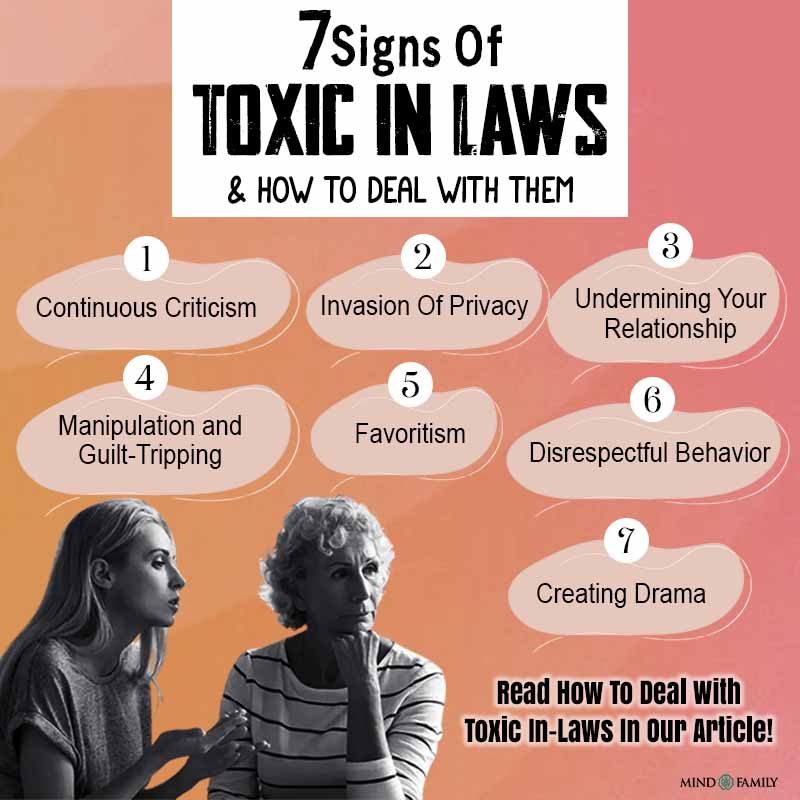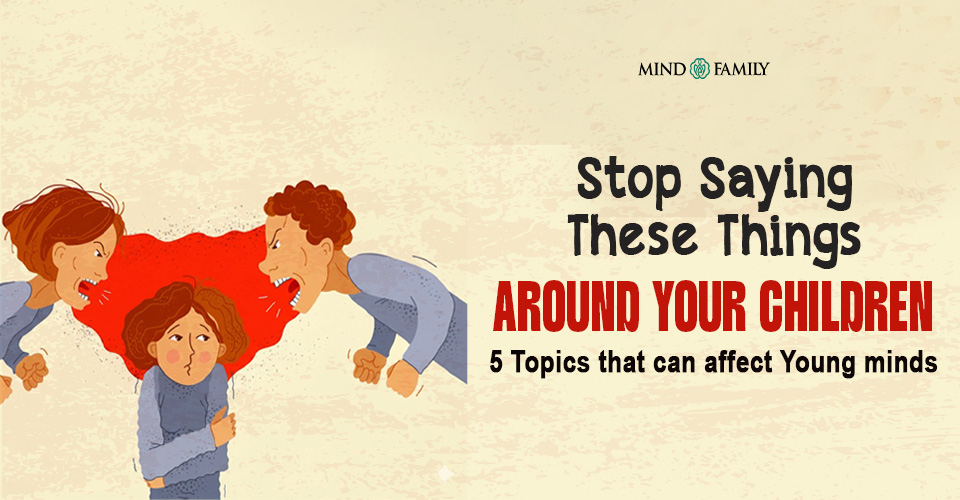Family relationships can be tricky to navigate, especially when it comes to dealing with signs of toxic in-laws. The consequences of these behaviors are far-reaching and detrimental to your health and relationship with them.
It is important to know the early indicators of a toxic in-law so that you can manage your encounter well while ensuring peaceful coexistence in the family.
Here we will look at seven signs of toxic in-laws and give suggestions on how best to deal with such people. If we confront this issue, we will be able to strive towards building a better family system where everyone feels loved and cared for equally.
7 Alarming Signs of Toxic In-Laws

1. Continuous Criticism
If you discover that your in-laws are always giving you or your spouse negative remarks, it can be very undermining. This constant string of criticism can undermine the choices we make our lifestyle and even our parenting style.
With time, such consistent negativity can erode your self-esteem and create a stressful atmosphere. Therefore you need to deal with these signs of toxic in-laws head-on!
We should also understand that this behavior is not only hurtful but also toxic. When we are constantly subjected to criticism, it can take a toll on our mental health as well as our relationship with our partner.
2. Invasion
One of the signs of toxic in-laws is that they are often unable to observe personal space. If they frequently show up uninvited, delve into private matters, or try to control different parts of life, then one should get alarmed.
They could also be intrusive in ways that cause discomfort and encroach upon your personal space. We all have a right to privacy; when in-laws overstep these boundaries however it is possible for anger/annoyance to creep in.
Clearly setting boundaries and effectively communicating them are important means of managing this problem.
3. Undermining Your Relationship
One of the signs of toxic in-laws is that there is constant interference between you and your partner. This might involve planting seeds of doubt, making derogatory remarks about one another, or simply starting arguments deliberately.
It makes us strain our relationship unnecessarily leading us to question each other’s compatibility instead of addressing these issues hand-in-hand with our partner so that we present a unified front against them before they begin any lasting damage.
4. Manipulation and Guilt-Tripping
One of the most alarming signs of toxic in-laws is that they are highly manipulative!
At such moments, you might find yourself constantly burdened by uncomfortable feelings of duty and obligation; it’s like walking on eggshells. Recognizing manipulation is key to managing these interactions effectively.
Instead of yielding to pressure or guilt, we should make decisions that benefit ourselves and our immediate families. Standing firm against such tactics is crucial for maintaining our well-being.
5. Favoritism
In cases where your in-laws tend to favor one family member over others, this can cause a sense of inadequacy or even bitterness amongst those not favored.

This behavior can be particularly damaging when it leads to unfair treatment and unequal attention. Favoritism can undermine family harmony and cause unnecessary strife.
We must speak up about it in a way that promotes fairness and equality whenever we come across this behavior. Encouraging open communication and striving for balanced treatment can help mitigate the negative impact of favoritism.
Read More: 7 Alarming Signs Of A Jealous Mother-In-Law And How To Deal With Their Toxicity
6. Disrespectful Behavior
There are many ways through which disrespectfulness could be displayed ranging from dismissive comments, and condescending remarks to outright rudeness.
Experiencing such behavior can erode your sense of belonging and self-worth, making interactions with in-laws feel draining.
When faced with disrespectful situations, we should address them calmly but firmly; aggression might escalate matters. Letting in-laws know that their behavior is unacceptable can help set boundaries and improve the overall dynamic.
Respectfully engaging others while holding them accountable will foster healthier relationships among us all.
7. Creating Drama
One of the signs of toxic in-laws is that they engage in drama and chaos, sometimes enjoying the disorder they instigate within the family. This conduct may result in unnecessary fights and emotional stress thus making family meetings burdensome.
Whenever we notice some of our in-laws causing problems all the time, it is important not to be part of their conflicts. Instead, concentrating on peaceable and constructive interactions will help reduce the impact of their interruptive behavior.
The best way to tame them is to address issues calmly and create a positive environment.
Apart from that, identifying such signs of toxic in-laws can enable us to take preventive measures towards self-preservation as well as healthier relationships among relatives.
Read More: 10 Subtle Signs of Jealous Family Members And How To Deal With Them
How To Deal With Toxic In-Laws?
Learning how to deal with toxic in-laws can be one of the most challenging aspects of family life.

Here are some tips on how to deal with toxic in-laws:
1. Set Clear Boundaries
When you are dealing with toxic in-laws, it is important to set and communicate limits. You have the right to define what behaviors you will and won’t tolerate.
This involves making clear your position on such aspects as visits, personal space, topics of conversation among others. Clear boundaries ensure that you do not suffer from unnecessary stress or encroachment by your in-laws.
We make a more respectful environment when we set these restrictions whereby our needs and desires are acknowledged. These boundaries should be communicated assertively but politely so that all persons are aware of what you anticipate.
Consistently reinforcing these borders ensures that we retain control and minimizes the likelihood of encroachment.
2. Communicate Openly with Your Partner
Your partner is instrumental in managing relationships with their families; hence open communication helps deal with these dynamics effectively.
One of the most important tips for how to deal with toxic in-laws is to Tell your partner honestly and openly about the problems, feelings, or experiences you have had concerning his/her relatives.
Working together with your partner to resolve any matters ensures that both of you share a common understanding and can present themselves as one person party. This partnership strengthens your bond while contributing towards addressing toxic behavior.
However, while approaching these discussions it is important to approach them empathetically considering that your spouse may have complex feelings about his family too.
In collaboration, however, friendly cooperation promotes handling family members’ interaction better when they are under certain circumstances.
3. Be Cool
It is important to be careful about our feelings when you deal with toxic in-laws. Reacting with anger, frustration or defensiveness only makes things worse in the end. Instead, try to stay calm even under very hard circumstances.
Keeping your composure enables you to think before you act and handle any potential conflicts that could arise with ease without engaging into unnecessary drama activities.
For example, regulate yourself by breathing deeply or waiting a while before responding to someone who has provoked you deliberately.
In case one finds it hard to manage their emotions, they could use mindfulness among other strategies or even get help from psychologists. By staying down-to-earth and keeping your cool during challenging situations helps a lot.
4. When Required, Reduce Interaction
Sometimes, limiting encounters can be the best way of coping with toxic in-laws. Cutting them off can greatly reduce stress levels and create room for personal time that will help improve your quality of life as well as your relationships.
Limiting how much time you spend seeing them or speaking with them creates a healthier balance and shields your mental health from damage.
Hence you should let them know politely that there are some specific numbers of interactions for their own good because otherwise they will not understand such limitations set on them.
In the case of highly stressful interactions, one may have to temporarily take oneself away from it all to become balanced once again if possible.
Minimizing contact reduces the impact they have on daily living and provides an indispensable break from the woes associated with unhealthy relations.
5. Safeguard your Relationship
Sometimes, toxic in-laws can cause tensions and conflict between you and your spouse, so it is necessary to keep the relationship first and address family dynamics issues if they occur.
Focus on reinforcing your partnership by spending quality time together and supporting each other. Learn how to face conflicts with in–laws as a team rather than allowing them to divide you.
Through open and honest discussions of how family concerns affect the health of the bond between partners, couples can find answers to their problems.
Work out areas where neither partner crosses the line when it comes to managing relationships with in-laws while being there for one another during difficult moments.
When you prioritize your partnership, you are also safeguarding your relationship from any negative impact brought about by toxic behavior.
Read More: 10 Subtle Signs Your Family Hates You And How To Deal With Them!
A Word From Mind Family
Recognizing the signs of toxic in-laws can be one of the most challenging aspects of family life. Dealing with toxic in-laws requires a delicate balance of maintaining personal boundaries while fostering harmonious relationships.
Remember, you have the right to a respectful and harmonious family life, and taking these steps can make a significant difference.
At Mind Family, we understand the complexities of dealing with toxic in-laws and are committed to providing support and strategies to help you navigate these challenging situations.
Together, we can work towards fostering healthier relationships and a more peaceful family environment.
Frequently Asked Questions (FAQs)
What are some signs of toxic in-laws?
Signs of toxic in-laws include constant criticism, intrusiveness, undermining your relationship, manipulation, favoritism, disrespect, and creating drama.
How to deal with toxic in-laws?
Learning how to deal with toxic in-laws includes setting clear boundaries, communicating openly with your partner, maintaining composure, limiting interactions, protecting your relationship, and focusing on positive interactions.
What should I do if my in-laws are invading my privacy?
Set and communicate clear boundaries regarding privacy, and assertively address any invasions to protect your personal space.












Leave a Reply